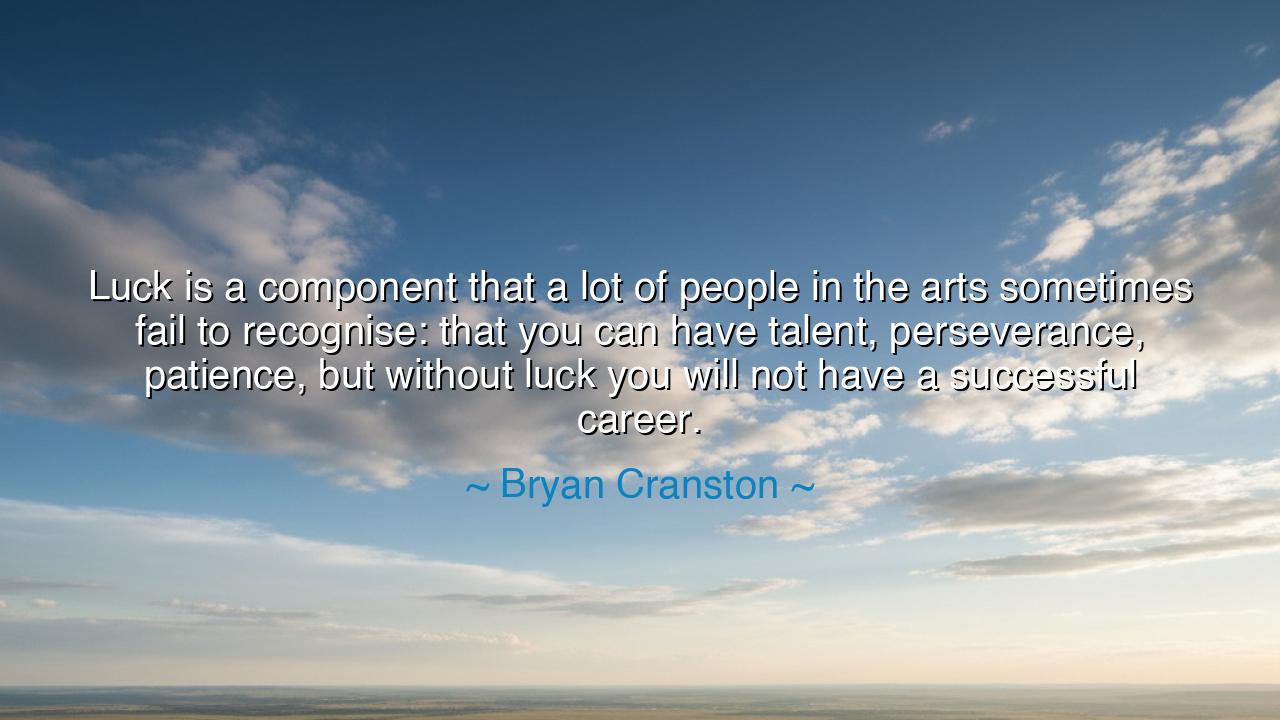
Luck is a component that a lot of people in the arts sometimes
Luck is a component that a lot of people in the arts sometimes fail to recognise: that you can have talent, perseverance, patience, but without luck you will not have a successful career.






The words of Bryan Cranston, a man who walked the long road from obscurity to becoming one of the most respected actors of his age, carry a truth both humbling and liberating: “Luck is a component that a lot of people in the arts sometimes fail to recognise: that you can have talent, perseverance, patience, but without luck you will not have a successful career.” Here he unveils a mystery that lies beyond human effort: that destiny is not forged by labor alone, but also by chance encounters, unexpected turns, and unseen forces that no mortal can command.
The meaning begins with the recognition of talent, perseverance, and patience. These are the great pillars of any artistic life. Without talent, there is no spark; without perseverance, there is no endurance through struggle; without patience, there is no survival in an industry of long waits and countless rejections. Yet Cranston reminds us that even these mighty virtues are sometimes not enough. There is also the hidden hand of luck — being in the right place at the right time, meeting the right person, or catching the fleeting wave of opportunity.
The origin of Cranston’s insight lies in his own journey. For years, he toiled as a working actor, known only for minor roles in commercials or small appearances on television. He had the talent, and he endured with patience, yet his breakthrough did not come until fate placed him in the role of Walter White in Breaking Bad. That moment of alignment between his readiness and the opportunity before him was not something he could have forced — it was the marriage of preparation and luck. Without it, his genius might have remained hidden from the wider world.
History is filled with examples of this truth. Consider Vincent van Gogh, who had boundless talent and deep perseverance, yet lived unrecognized in his lifetime because fortune did not smile upon him. His art only found glory long after his death. Contrast him with William Shakespeare, who certainly possessed great genius, but also benefited from luck — writing during a time when the English language was flowering, theaters were thriving, and a queen patronized the arts. Without that historical moment, even Shakespeare might have remained unknown to us.
This does not mean that luck alone brings success. Rather, Cranston teaches us that luck rewards those who are prepared. It is the spark that ignites the fire, but without the wood of perseverance and the oil of patience, the flame cannot burn. Those who live idly, waiting only for fortune, are like empty fields where even the best rains cannot bring harvest. But those who labor faithfully, who keep their craft honed and their spirits steady, are ready to seize fortune when it arrives.
The lesson for us is both sobering and empowering. We cannot control every outcome. We cannot summon luck at will. Yet we can control how we prepare, how we endure, and how we respond when opportunity knocks. If we do our part, then when chance comes — whether through a conversation, an unexpected door, or a moment of recognition — we will be ready to step into it.
Practical action flows naturally from this teaching. Cultivate your craft daily, even when recognition is absent. Practice perseverance when doors close, and patience when years pass without reward. At the same time, remain open to chance — speak to strangers, take opportunities that seem small, embrace paths that diverge from your expectations. For luck often wears the disguise of the ordinary. And when it comes, as Cranston teaches, it may carry you into the destiny you could never have reached alone.
Thus, let Bryan Cranston’s words be remembered as a reminder to all who labor in the arts and beyond: success is a tapestry woven of skill, endurance, patience, and the mysterious thread of luck. Honor the part that is yours, but remain humble before the part that belongs to fate. And if fortune does not smile today, continue steadfastly, for the greatest triumphs often come when preparation and luck finally meet.






AAdministratorAdministrator
Welcome, honored guests. Please leave a comment, we will respond soon